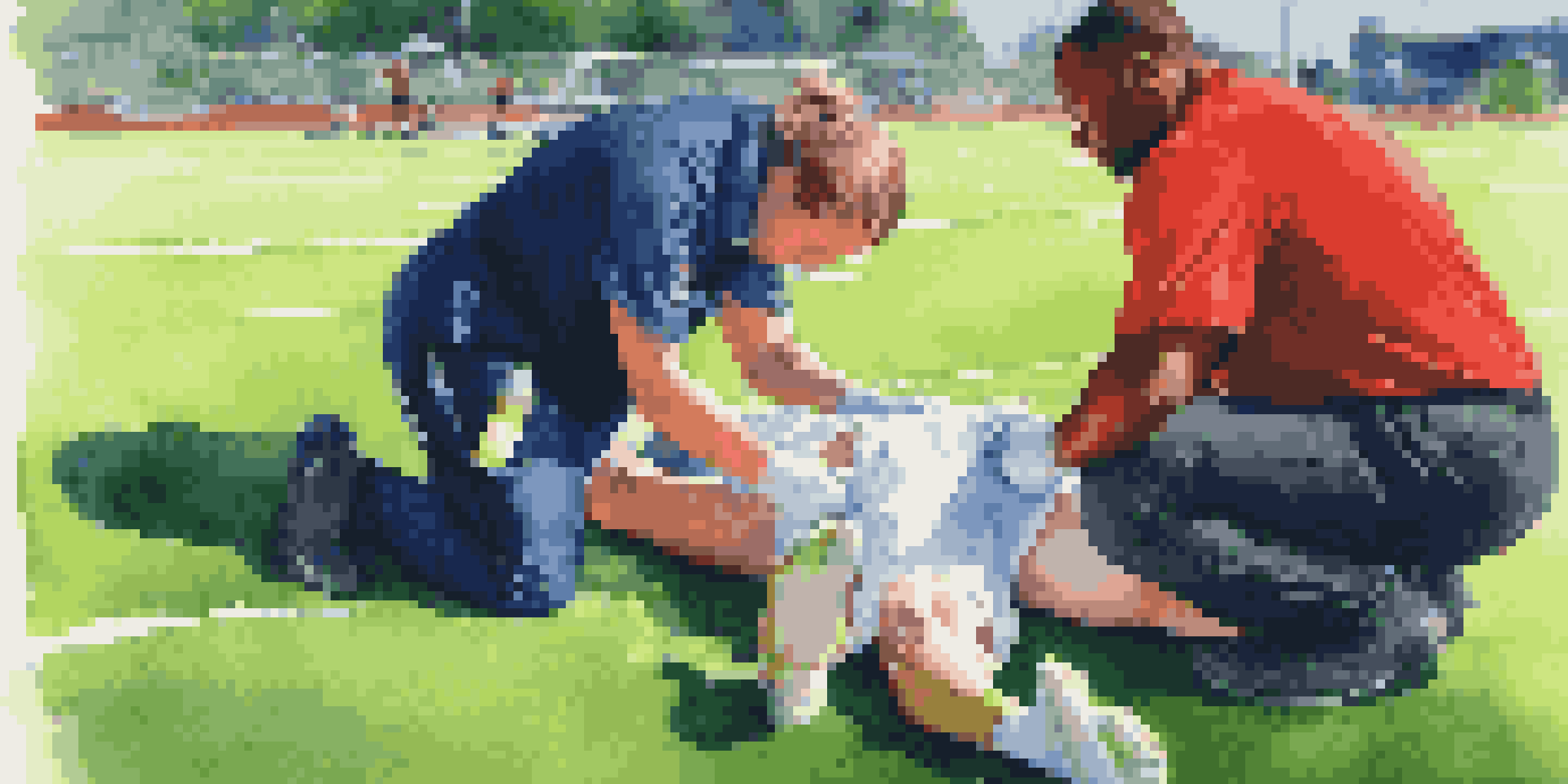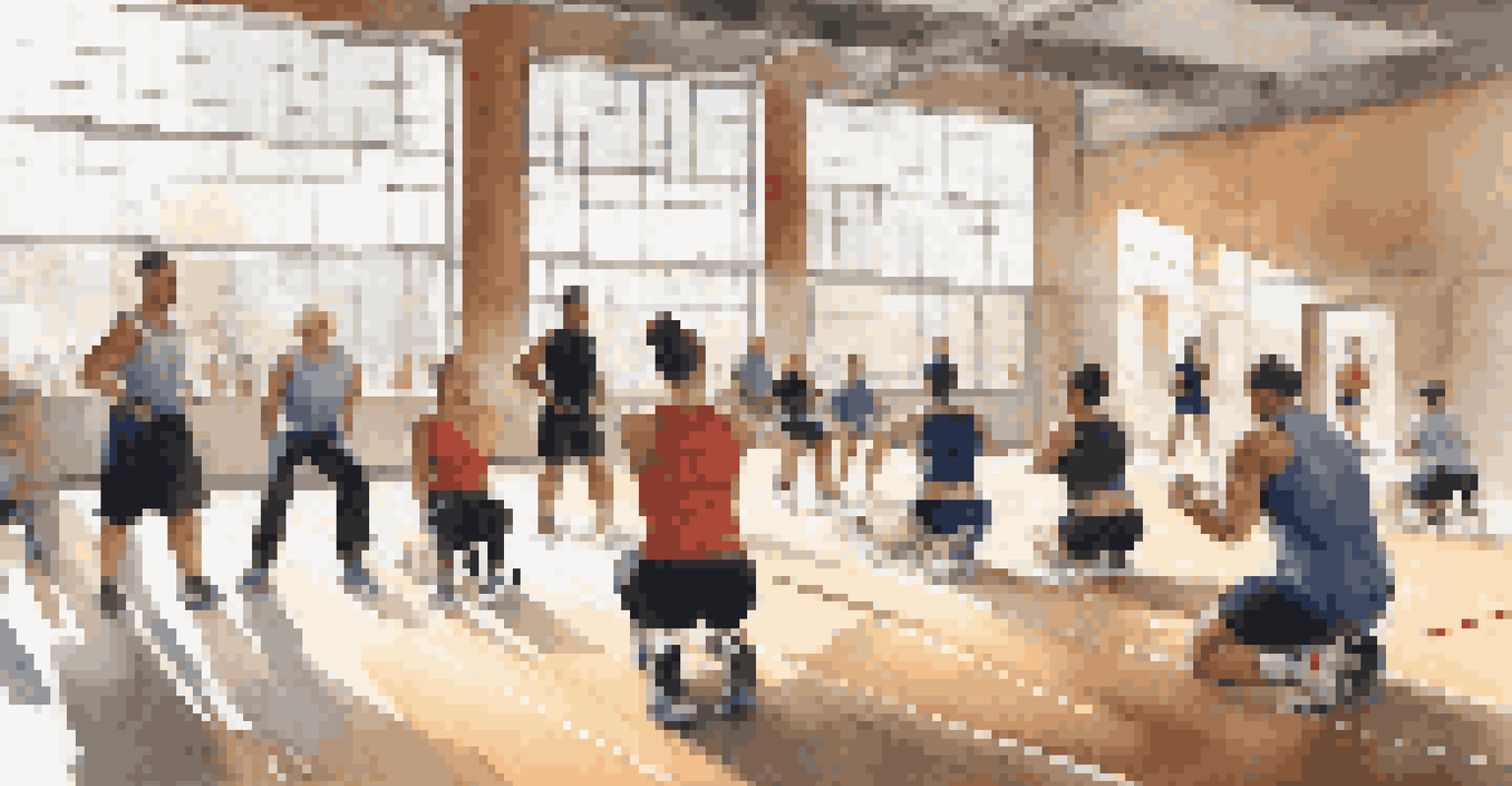The Role of Athletic Trainers in Injury Response and Recovery

What Are Athletic Trainers and Their Key Responsibilities?
Athletic trainers are healthcare professionals dedicated to the prevention, diagnosis, and treatment of sports-related injuries. They work closely with athletes across various settings, including schools, colleges, and professional sports teams. Their expertise not only includes injury management but also encompasses rehabilitation and performance enhancement.
In the middle of difficulty lies opportunity.
One of the primary responsibilities of athletic trainers is to provide immediate care when injuries occur. This can range from applying ice and compression to more complex assessments and interventions. Their ability to respond quickly can significantly influence an athlete's recovery trajectory.
In addition to direct injury response, athletic trainers also play a crucial role in educating athletes about injury prevention strategies. This proactive approach helps athletes understand their bodies better and reduces the risk of future injuries, fostering a healthier athletic environment.
Immediate Response: The First Line of Defense
When an athlete gets injured, every second counts. Athletic trainers are often the first responders on the scene, equipped with the skills to assess the situation quickly and effectively. Their immediate actions can dictate the severity of the injury and the recovery process that follows.

For example, if an athlete suffers a sprained ankle during a game, the trainer will apply the RICE method—Rest, Ice, Compression, and Elevation—to manage swelling and pain. This swift care not only alleviates discomfort but also sets the stage for a smoother recovery.
By providing an accurate assessment of the injury, athletic trainers can determine whether an athlete can return to play or needs further medical evaluation. This decision-making process is vital in ensuring the athlete's long-term health and safety.
Injury Evaluation: Assessing Damage and Impact
After the initial response, athletic trainers conduct a thorough evaluation to understand the nature and extent of the injury. This involves taking a detailed history of the injury, observing symptoms, and performing physical tests. Their specialized training allows them to pinpoint the issue accurately.
The greatest glory in living lies not in never falling, but in rising every time we fall.
For instance, in the case of a concussion, the trainer will utilize various assessment tools to measure cognitive function and balance. This objective data is crucial for determining whether an athlete is fit to return to play or needs more time for recovery.
Effective injury evaluation also informs the development of personalized rehabilitation plans. By understanding the specific injury, athletic trainers can tailor recovery strategies that align with the athlete's needs and goals.
Rehabilitation: Guiding Athletes Back to Peak Performance
Rehabilitation is a critical phase in the recovery process where athletic trainers guide athletes through structured exercises and routines. This phase focuses on restoring strength, flexibility, and functionality, helping athletes regain their confidence and skills. It's a collaborative effort that includes both the trainer and the athlete.
For example, if an athlete is recovering from a shoulder injury, the trainer may create a regimen that includes stretching, strengthening, and sport-specific drills. This tailored approach ensures that the athlete is not only physically prepared but also mentally ready to return to competitive play.
Throughout the rehabilitation process, athletic trainers continuously monitor progress and adjust the program as needed. This adaptability is key to ensuring a successful recovery and minimizing the risk of re-injury.
Education and Prevention: Empowering Athletes
Athletic trainers play a vital role in educating athletes about injury prevention strategies. By teaching proper techniques, warm-up routines, and strength training, they empower athletes to take charge of their own health. This proactive approach can significantly reduce the incidence of injuries.
For example, a trainer might implement workshops that focus on the biomechanics of movement, helping athletes understand how to move safely and efficiently. This knowledge not only enhances performance but also fosters a culture of safety within the team or organization.
Ultimately, education is an ongoing process. Athletic trainers continually provide resources and support, ensuring that athletes remain informed and proactive about their health throughout their careers.
Collaboration with Healthcare Professionals
Athletic trainers often work alongside other healthcare professionals, such as physicians and physical therapists, to provide comprehensive care for injured athletes. This collaborative approach ensures that athletes receive the best possible treatment and recovery support. Each professional brings unique expertise to the table, creating a well-rounded support system.
For instance, while athletic trainers manage immediate care and rehabilitation, a physician may provide diagnostic imaging or prescribe medication. Physical therapists can then assist with more advanced rehabilitation techniques, ensuring a smooth transition back to sport.
This teamwork not only benefits the athlete but also enhances communication among all parties involved in the recovery process. By sharing insights and strategies, they create a unified approach that prioritizes the athlete's health and well-being.
Mental Health: Supporting Psychological Recovery
Injuries can take a toll on an athlete's mental health, making emotional support an essential aspect of recovery. Athletic trainers are often in a unique position to provide this support, as they build trusting relationships with the athletes they work with. They can offer encouragement and motivation during tough times, helping athletes navigate the emotional challenges of injury.
For instance, an athlete recovering from a serious injury may experience feelings of isolation or frustration. The athletic trainer can help by facilitating discussions about these feelings and connecting the athlete with mental health resources if needed. This holistic approach acknowledges that recovery is not just physical but also emotional.

By prioritizing mental health alongside physical rehabilitation, athletic trainers contribute to a more comprehensive recovery experience. They empower athletes to address their mental well-being, fostering resilience and a positive mindset as they work toward returning to their sport.